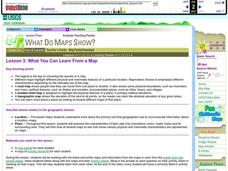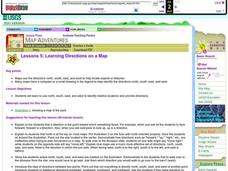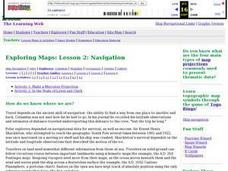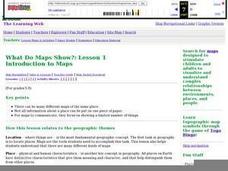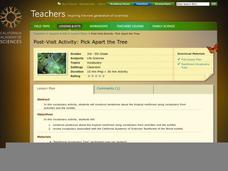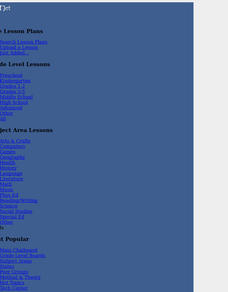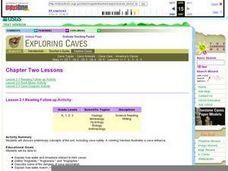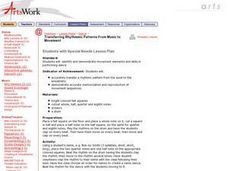Curated OER
The Process of Art Criticism
Students interpret possible meanings of works of art by analyzing how specific works are created and how they relate to historical and cultural contexts
Curated OER
What You Can Learn From a Map
Pupils investigate the use of road maps, shadeded relief maps, and topographic maps.
Curated OER
Learning Directions on a Map
Students use north, south, east, and west to identify relative locations and provide directions.
Curated OER
Clerihew Dances III, 4 and 5
Third graders relate dance movements to chants. They tap out the rhythm of poetry on different body parts.
Curated OER
Columbus Day / Computer
Help your class explore holidays and important people. They will use a computer to find out important information on Christopher Columbus. The will research his voyages, ships, and history of that time period. They will then incorporate...
Curated OER
What's The Story?
Groups of learners get together and are given copies of the state quarter reverses from the 2002 US Mint issue. Each pupil makes up a story that's based on the scene that appears on the reverse side of the quarter. The goal is for all...
Curated OER
Pumpkin Problems
Students participate in a lesson that has the intention of working on estimation skills. They use pumpkins to estimate the number of seeds are inside. They collect data for each pumpkin and compare it to the estimation. Students question...
Curated OER
Exploring Maps: Navigation
Learners engage in a activity that is concerned with the concept of navigation while research is conducted with the use of a variety of resources. The information is used to expand their perspective of the applications for navigation....
BBC
Local Democracy
Expanding our students' understanding of government at a local level is a great way to build an understanding of government at a global level. Start the understanding by using any of these fun teaching ideas. Learners engage in several...
Curated OER
Geography and Culture
Students explore African geography, study the overall continent of Africa and its individual countries, discuss demographics, and participate in research and class activities.
Curated OER
Origins and Identity
Students examine how to research their family backgrounds. They conduct interviews with various family members, create a family tree, and present their family tree to the class.
Curated OER
Testing the Accuracy of a Rain Gauge
Students identify and test variables that may affect the accuracy of a rain gauge. They share findings of their research with the class in a 'mini-meteorology-convention'. They design an experiment with a control setup to test their...
Curated OER
Exploring Caves
Students explore the various characteristics of caves. Through class discussion and hands on activities, students identify what forces converge in the creation of a cave. They complete review activities at the conclusion of the lesson...
Curated OER
What Do Maps Show?: Lesson 1 Introduction to Maps
Students brainstorm a list of the different types of maps they have seen or used. Using the activity sheet, they look through a social studies book to find all the maps and to determine what they are used for. Using a poster, they review...
Curated OER
Piñatas
Students discover the original uses and ceremonial meanings of the piñata and how it changed. In this piñatas lesson, students create their own piñatas. Students explain in Spanish the reasons for their designs.
Curated OER
Protect the Primates
Students make posters about saving the primates. In this primates lesson plan, students discuss primates and environmental changes and make posters with pictures about saving primates.
California Academy of Science
Pick Apart the Tree
In only 30 minutes, your class will have increased their rainforest vocabulary. They visualize the things they have seen on a recent trip to a rainforest exhibit. Then, they create sentences for each of the rainforest-related vocabulary...
Teachers.net
Chicka-Chicka-Boom-Boom/ Chicka Challenge (Elementary, Literature)
Is your Kindergarten class about to read the book, Chicka-Chicka-Boom-Boom? If they are, and you want a few wonderful activity ideas to reinforce phonemic awareness and letter identification skills, look no further. Here you'll find over...
Curated OER
Clerihew Dances II
Third graders explore rhythm and quality of word and phrased to that of dance. They move to the rhythm of poetry.
Curated OER
Introduction to Maps
Young scholars investigate a variety of maps to explain what each one is used for.
Curated OER
Reading Follow-up Activity
Students color a worksheet while discussing characteristics and composition of caves.
Curated OER
How Deep Do They Dive
Students calculate and graph the diving depths of various types of whales. They cut out and glue whale pictures on a worksheet to represent the diving depths for five whales, and discuss how people use graphs to communicate.
Curated OER
Transferring Rhythmic Patterns From Music to Movement
Students identify and demonstrate movement elements in relation to musical notation. They clap to rhythms, beat on drums, match musical notes to speech patterns and use the rhythms of the their names to create a dance.



